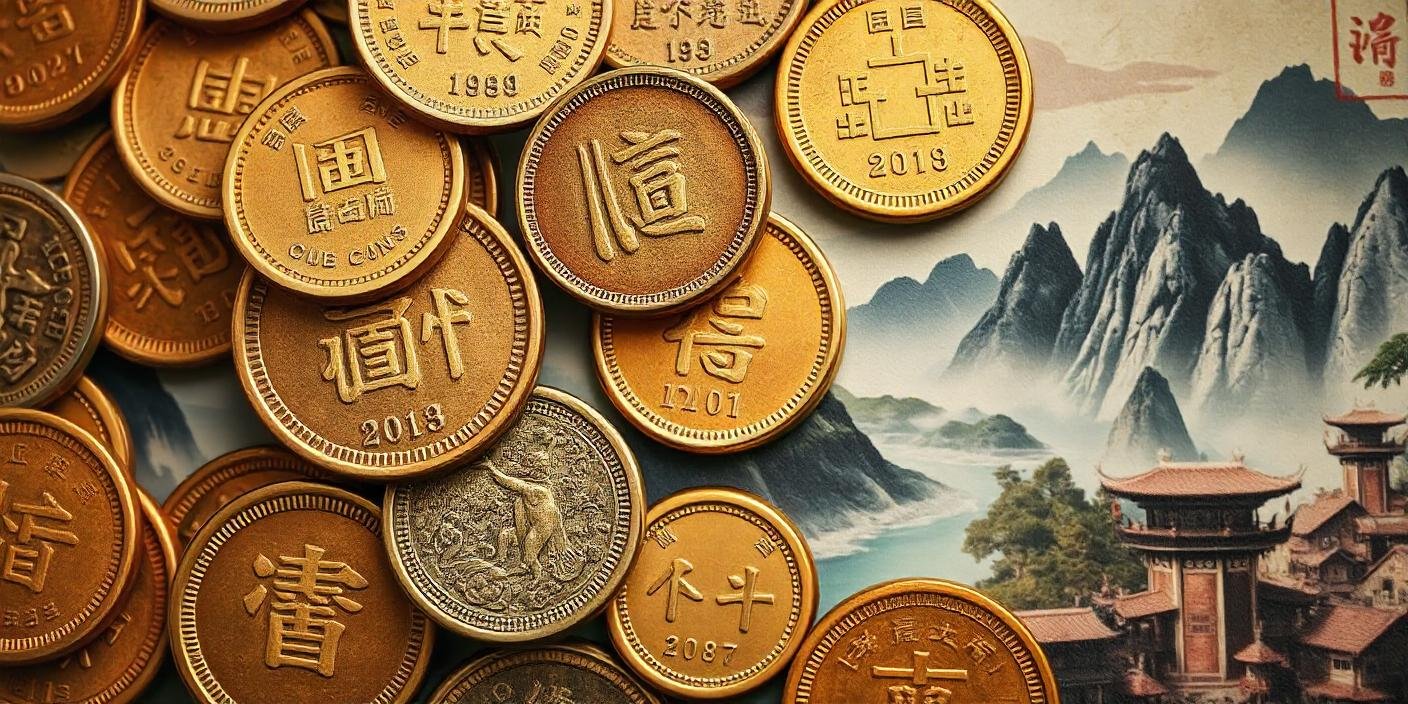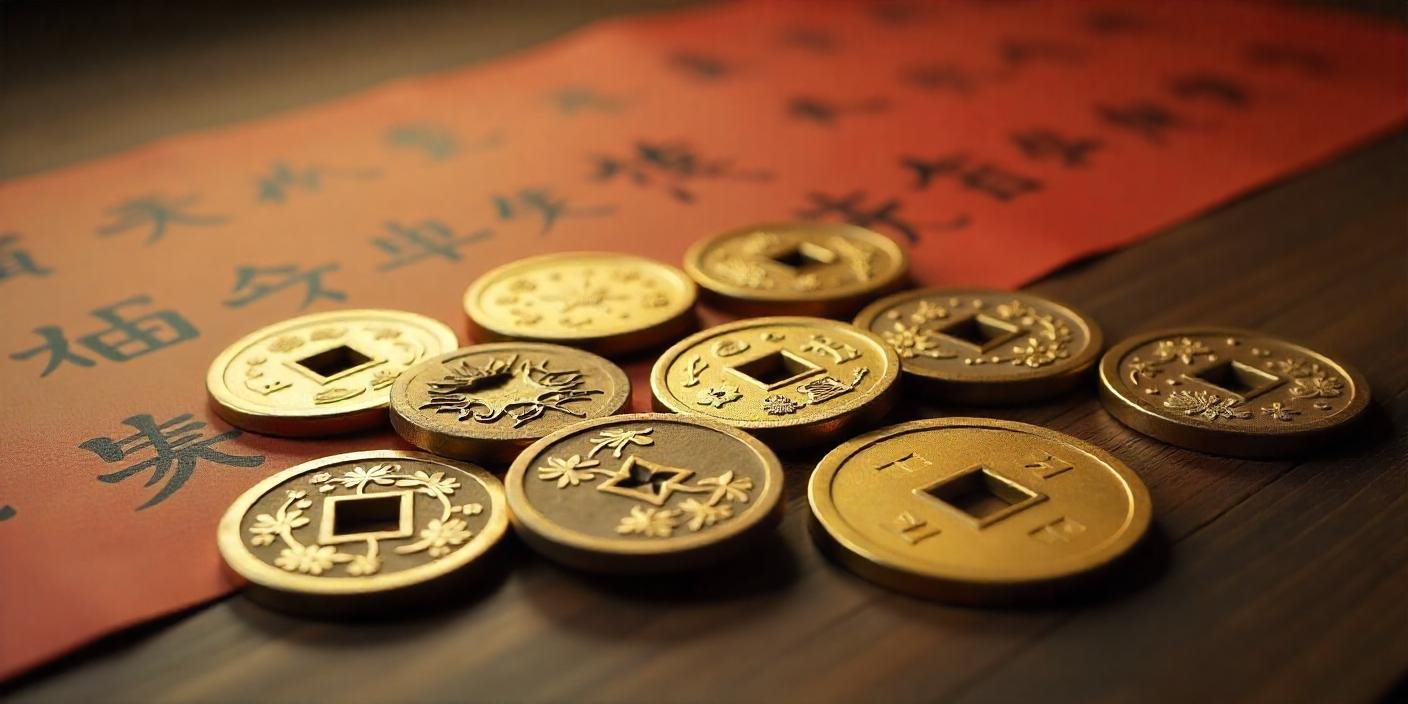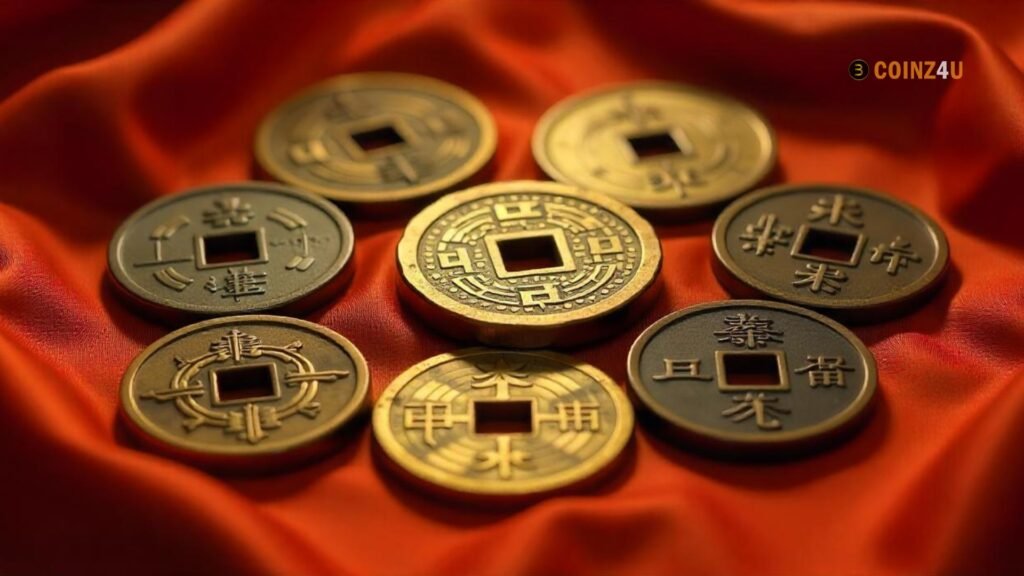There is a lot of cultural and historical interest in square-holed Chinese coins. These coins are among the most famous relics from ancient China, and for good reason: they represent stability, wealth, and safety. For ages, their one-of-a-kind construction, function, and significance have captivated collectors, historians, and culture vultures. For anyone curious about these priceless artifacts, this essay covers all the bases: where they came from, what they symbolize culturally, and how much they are worth now.
Chinese Coins with Square Holes: Origins
The Zhou Dynasty (1046-256 BCE) is the earliest known Chinese coinage featuring a square hole. The first coins represented a type of barter system. They were bronze in composition and fashioned like small replicas of agricultural implements. The later circular coins with square holes evolved from these earlier coins and served both as functional currency and a symbol.
The circular design of the coin symbolizes heaven, while the central square hole represents Earth. Dualism, an essential concept in Earthse culture, represents an old belief in the harmony of heaven in Chinese cosmology. These coins helped China unify its monetary system and were widely used in daily transactions.
Evolution of the Chinese Cash Coin

In common usage, “cash coin” denotes circular Chinese coins with square holes. Currency was standardized across China by the first emperor, Qin Shi Huang, during the Qin Dynasty (221-206 BCE). Circular coins with square holes were minted due to this choice and were used for over two thousand years by different dynasties.
The coins usually have Chinese characters engraved on them. The ruling emperor’s era name allowed each dynasty to leave its mark. Casting, instead of striking, allowed for the mass manufacture of the coins by pouring molten metal into molds. Cash coins from different dynasties can be easily identified by collectors today because of their unique size, weight, and lettering style.
Symbolic Meaning and Cultural Significance
More symbolic overtones are associated with the square-holed Chinese coin than its monetary value. Its square hole and circular form represent. Chinese culture and the traditional belief in heaven’s oneness thought of talismans with prosperity, fortune, and protection characteristics.
Coins were kept as cultural relics and emblems of success and good fortune long after they were no longer used as currency. Many Chinese homes display miniature versions of these coins in entryways and windows to protect themselves from bad spirits and welcome good fortune.
Feng Shui and the Power of the Chinese Coin
One of the most potent symbols of prosperity, success, and good fortune in Feng Shui is the square-holed Chinese coin. To increase their power, practitioners often bind three, six, or nine coins with a crimson string and place them in different spots about a house or business to encourage financial success.
- Three Coins: These are often tied together to represent the unity of heaven, Earth, humankind, Earth, heaven, Earth, and abundance.
- Six Coins: This arrangement attracts support and protection from influential people or beneficial relationships.
- Nine Coins: Symbolizing completion and the peak of achievement, those who wish to maintain long-lasting success often use nine coins.
Their symbolic use in Feng Shui highlights their enduring cultural relevance and attractiveness in creating harmony and fortune.
Collecting Chinese Coins with Square Holes
Chinese cash coins with squares are in high demand among collectors throughout. The items’ historical, artistic, and monetary value is the reason for the wholes. Each coin’s worth in this ever-changing market is based on several factors, including its rarity, age, condition, and historical context.
- Rarity and Age: Coins from specific dynasties or those with unique inscriptions can be significantly more valuable, especially if they are in good condition.
- Historical Context: Coins minted during tumultuous periods, such as the reign of famous emperors or during wars, often hold particular value to collectors.
- Condition: Coins in pristine condition, with clear inscriptions and minimal wear, are naturally more desirable and fetch higher prices.
The Value of Chinese Coins with Square Holes Today

Chinese coins with square holes can have wildly different values depending on several conditions. Historical importance attracts collectors of Tang and Song dynasty coins (618-1279 CE). While they may not be as popular, coins from less well-known periods might be valuable to some collectors.
For example:
- Common Coins: Coins from the later Qing Dynasty (1644–1912) are relatively abundant and may be priced between $10 and $50.
- Rare Coins: Coins from earlier dynasties, like the Han or Tang, or coins with unique inscriptions, can range from $100 to several thousand dollars, depending on condition and demand.
Due to counterfeit coins, collectors and investors must deal with trustworthy merchants and obtain authenticity certificates to ensure original items.
Caring for and Displaying Chinese Coins with Square Holes
Only proper handling and preservation can preserve the value of Chinese yuan coins. These bronze or copper alloy coins will rust in acidic or damp environments. Coin holders or display cases can help collectors keep their coins from oxidizing.
They display these coins in a classic wooden frame or a velvet-lined box. They will keep them safe from dust and dirt while adding to their visual appeal.
Final Thoughts
The square-holed Chinese coin is more than just money; it is a priceless cultural relic that echoes. Ancient Chinese thinkers held the ideals of heavenly and terrestrial harmony. Coins like these have always fascinated people, whether it’s because of their historical relevance, collection value, or symbolic meaning in Feng Shui. The eternal appeal of these coins makes them priceless treasures in the present. They offer a captivating peek into a rich and legendary past—perfect for history buffs, collectors, or anyone interested in Chinese culture.
FAQs
What do the circular shape and square hole symbolize in Chinese coins?
The circular design of the coin symbolizes heaven, while the central square hole represents Earth. This design reflects dualism, an essential concept in Chinese culture and cosmology, representing the ancient belief in the harmony between heaven and Earth. These symbolic meanings made the coins more than just currency—they became cultural talismans associated with prosperity, fortune, and protection.
When did Chinese coins with square holes first appear and how long were they used?
Square-holed coins first appeared during the Zhou Dynasty (1046-256 BCE), evolving from earlier bronze coins shaped like agricultural implements. The design was standardized during the Qin Dynasty (221-206 BCE) under Emperor Qin Shi Huang and remained in use for over two thousand years across different dynasties until the early 20th century.
How are Chinese coins with square holes used in Feng Shui?
In Feng Shui, these coins are powerful symbols of prosperity and good fortune. Practitioners often bind three, six, or nine coins together with red string and place them strategically around homes or businesses. Three coins represent the unity of heaven, Earth, and humankind; six coins attract support from influential people; and nine coins symbolize completion and peak achievement for maintaining long-lasting success.
What factors determine the value of Chinese square-holed coins today?
The value depends on several factors, including rarity, age, condition, and historical context. Common coins from the later Qing Dynasty (1644-1912) may be priced between $10 and $50, while rare coins from earlier dynasties like the Han or Tang, or those with unique inscriptions, can range from $100 to several thousand dollars. Coins in pristine condition with clear inscriptions are naturally more valuable.
How should collectors care for and preserve Chinese square-holed coins?
These bronze or copper alloy coins can rust in acidic or damp environments, so proper storage is essential. Collectors should use coin holders or display cases to prevent oxidation. Displaying coins in classic wooden frames or velvet-lined boxes protects them from dust and dirt while maintaining their visual appeal. It’s also important to purchase from reputable dealers and obtain authenticity certificates to avoid counterfeits.


